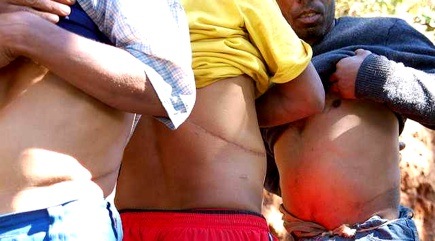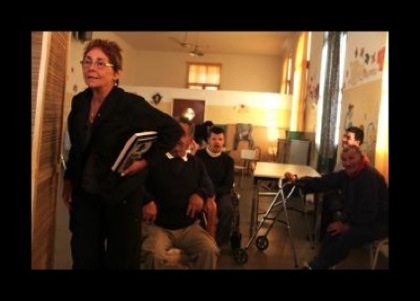By Aleksandra Bartoszko. Oslo University Hospital, Equality and Diversity Unit

Scars after removal of a kidney. Photo: bee free patrrizia grandicelli, flickr
See part I of the interview Being radical critical without being leftist
Spring 2011 I attended seminar “Engaging medicine” at the University of Oslo in honor of one of the most prominent medical anthropologists in Norway - Benedicte Ingstad. One of the speakers was Nancy Scheper-Hughes with a paper “Medical Migrations – From Pilgrimage and Medical Tourism to Transplant Trafficking».
Scheper-Hughes is professor of anthropology and director of the program in Critical Studies in Medicine, Science, and the Body at the University of California at Berkeley. She is known for her research on structural and political violence, anthropology of body, illness, suffering, maternity and poverty. Her most famous publications are monographs Saints, Scholars and Schizophrenics: Mental Illness in Rural Ireland and Death without Weeping: the Violence of Everyday Life in Brazil.
Since I got engaged in medical and critical anthropology, Scheper-Hughes has been to me a constant source of inspiration and provocation. As an anthropologist who supports and has been doing public and applied anthropology she co-founded Organs Watch, a medical human rights project focusing on organ trafficking. In more than ten years she has been working on the global organ trade. Following the illegal flow of kidneys, she has mapped the tragic network of rich buyers and poor sellers all over the world.
I always wondered how her adventure with kidneys started. She answers:
– It was a very different kind of a project and it was not one that I ever could have imagined spending so much time on.
– I wrote an article that emerged from chapter 6 of my book “Death without weeping” where I write about bodies in dangers, the dead body and favela residents’ fears and their feelings of ontological security or insecurity of the body. And I was studying the emergence of local death squads that were operating after the end of the military period, taking the place of the militarized state. I found that there was real medical mistreatment of poor bodies in clinics, in forensic institutes, and in the graveyard. And above all of this was hovering a terror that people had that their bodies would be used for organs. So I wrote some articles trying to explain why people thought they would be subject to kidnapping for the purpose of organ theft.
– At the time I still thought that this was mainly an urban legend. But then underneath the legend were these real experiences that poor people encountered in forensic medical institutes or police morgues where the unidentified, unclaimed body was, in fact, state property, and (to be crude) chopped up and harvested. So the people were right in fearing that their bodies were not safe.
– Then I was invited to the Rockefeller Institute’s Bellagio Conference Center in 1996 for a high powered international meeting with transplant surgeons from several countries, North and South, East and West. And my job was, I think, to reinforce the confidence of these transplant surgeons that there was really no need to worry about theft of organs, that it was an urban legend but this is why people believe it. And because I was the only anthropologist and the meetings were long, I took walks with several of the surgeons from Russia, USA, Israel, Taiwan and elsewhere. And each one told me stories that led me to realize that the traffic in organs was real. Then, in 1997 on a trip to Israel I heard about the transplant and organ brokers.

Nancy Scheper-Hughes. Photo: UC Berkeley
– So bit by bit I began to realize that this was serious business. By the end of this Belagio meeting, I was nominated to do some ethnographic work on that subject. In fact it was simply to discover and to document: what in world is going on?
Since the Belagio meeting, Scheper-Hughes has traveled all over the globe and followed the organ transplant community:
– In the early days when I thought: “Oh God, this traffic is really damaging people, both the buyers and the sellers, I need to stop this”, I would go to the International Transplant meeting, then I would go to the American transplant meeting, to the Canadian, Polish, Brazilian. But then I said: “No, I can’t spend the rest of my life going to the transplant meetings”.
– But each place I traveled as an anthropologist I would learn very different notions of the body, organs, what is acceptable and what is ethical. I was surprised to learn that in France there is very little living kidney donations; it is just not done. And I am talking about within loving families and altruistically. “No”, I was told, “That’s barbaric, why would we ask healthy people to sacrifice a body part to someone else when we should be getting from the dead?” And also, some transplant coordinators in some countries say that dealing with deceased donation is also very difficult. “It’s too hard because you have to deal with people in grief and mourning, it’s undignified to be asking them over the dead body. It’s easier to ask living people”.
– But then you go to countries where living donation is common and people will say: “You know, it’s good for the solidarity of the country for people to do this”. So you really see these alternative ethics that work. So some of these travels were really important.
Working on the organ trade she became interested in understanding commodification process and the reification of parts and body parts. These interests resulted in “Commodifying Bodies” co-edited with Loïc Wacquant. She also developed interest in the body itself, the meaning of scars and the differential experiences of selling a kidney.
She gives an interesting example:
– In the Philippines the scars of the surgical removal of a kidney means you are person of honor. It means: “I have taken care of my family”. As opposed to Moldavians who are ashamed of being caught up in the transplant trade and they say they had an accident when I looked at their scars. Or in Brazil where the kidney sellers who were recruited to South Africa to provide kidneys to wealthy transplant tourists, they are called the mutilated ones because the beautiful body is so important to Brazilians. Men and women love their bodies. It’s interesting how they defend themselves in neoliberal, but it really is pre-neoliberal notion of “it’s my body”. It’s almost an anarchy of the body, of the self.
When I asked if I understood correctly that she doesn’t see all the organ sellers as victims she said she had two answers:
– Yes, the kidney sellers were exploited. Pure and simple. They were deceived. They were considered objects. Sometimes they have personal relationships with the brokers. So in that sense, yes, they were victims.
– But is there still agency? Yes, of a limited sort. I usually rephrase Marx: people make history but they don’t make it just as they please. Or under conditions of their making. Well, people here are making choices but not just as they please.
– The kidney sellers in Manila want to sell an eye, a whole eye ball. They want to sell a testicle. They want to sell any organ of which they have two. Why? Because if it’s a job, if they are commercial workers, a kidney is a one off deal. It is not reproducible. The only other option for a kidney seller who is still in debt is to allow their teenage children to sell, or their wives to sell, and by recruiting within their family, they can get a little bonus of about $50.00 for handing them over to the organs brokers. Not very pretty. Structural violence gets reproduced within the household.
– But the Brazilian kidney sellers don’t want publicly to be called victims. Brazil has a pretty good organized system for the capture of organs, but the bureaucracy is corrupted in different parts of the country and the waiting lists there were a mess.
– And this was leading to what I would call patron-client kidney donations. They are people who are life long retainers, household servants, nannies and cane cutters with their bosses asking them to provide kidneys. What kind of choice is that? But it fits very well into a very classic patron-client relation. And the people would say that they gave their consent: “Oh, willingly”. Or: “Of course I would give to this household I’ve been serving”. Because their livelihood, their very survival depends on their bosses. So they must do it. It doesn’t even make any sense to think that you wouldn’t do it.
– So choice is there, but if choice were the only thing that mattered the answer is very simple – that everybody sells. But choices are not the only thing that matters because the choices are over determined, part of the logic of a bad faith economy, as Pierre Bourdieu would put it.
Scheper-Hughes is critical towards the jargon used by transplant community and terms like “organ scarcity”, which contributes to the development of the moral obligation to be a donor. She responses with term “artificial scarcities”, which expresses the socially and politically created phenomenon.
This term arises strong reactions. She is also criticized by many of the potential kidney buyers who accuse her of «producing extraordinary suffering in the world» as she is against the black markets. In a response to one of the many letters she receives she wrote a brochure on what you should think about before you buy or sell a kidney. She explains:
– It’s not a cogito ergo sum, I think therefore I am, but “embodied, therefore I am”. So the first principal is that you have a right to your body. You are existentially thrown into the world with your body. Sometimes they are imperfect. Sometimes they are disabled bodies. But they are your bodies. And they are your treasure, your legacy. You do have a right to donate. But you don’t have an obligation to donate. No one has a right to demand it of you. Because that demand is a kind of invisible sacrifice that’s being asked. And it puts the asker, the demander into a moral and ethical gray zone. You know, making demands of another in the desire for self-survival.
– If you have absolutely made up your mind that you must have, as one of the potential buyers calls it, “a fresh native kidney” from someone, and you say that you don’t want to ask a relative and it’s better to pay somebody who is doing it for a living, I will make one adjustment to that. I’m not against money. We live in a world where markets mean a lot of different things to different people, I mean desires and friendship and sociability, as in many parts in the Middle East. And of course markets can be a good thing.
– So, why can’t we maybe bargain over a kidney? Well, I have argued that the kidney is not a redundant organ, that there is no such thing as a ‘spare’ kidney. You pay a big price in bartering over the value of your ‘spare part’. So I would ask the buyers that if they feel it is what you must do, then pay a relative, pay a dear friend. Because you’ll make then sure you will look after them. Pay your wife. Put a nephew through college who has no way of going to college.
– Is there any objection to that? Families are doing it all the time in different ways, circulating money through wedding obligations, making loans. And being indebted to someone is not necessarily servitude. There were times and places where gifts and debts were the same. And so, a gift is a kind of debt after all. That’s what Marcel Mauss is all about. So why not kidney debts within families?
– But just be sure you are not asking a sacrifice. People are not angels. They are not sprits, they have a body and its organs are limited. They have a right to those organs. But if they are in a relationship with kinship and affection and love, don’t just take it. Give something back that really matters to you and that obligates you to further gifting and responsibility for each other’s welfare and wellbeing. Don’t pay a stranger to whom you owe nothing but a one off payment.
– So I think these are anthropological questions. They have to do with kinship, with nature of gifting, the nature of debt and body debts.
The engaged anthropologist has been addressing the uncomfortable truth about the organ trafficking to transplant surgeons, politicians, the House of Lords etc. What was the major challenge with addressing her work to these groups? What were the reactions? Do they want to hear all that? Do they get angry?
– Well, it’s changed. Sure they get angry. Often, in the early days, I was in the international transplant meeting and transplant coordinator got up and called me a kidney terrorist because I was preventing kidneys from being moved around.
– I used to say to some transplant people, if you are satisfied living in a world where the third world have to pay a body tax to help the rich and you are satisfied with that, then I have nothing else to say to you. If that worries you a little bit than I think we can sit down and have a conversation.
– But of course there is resistance. Since the Istanbul Summit in 2008 there are now a key core of transplant doctors who really are rephrasing everything that I’ve been saying over the years. So I feel like a good part of my job is over. I mean, I don’t think that any profession can totally police itself without some outsider perspectives. I think that transplant profession needs help from social scientists who are critical thinkers and independent of medicine. It is not a job for bioethicists because they often share a worldview with the surgeons. They are not critical or independent enough. But basically I feel that more or less political job is done.
Video: Nancy Scheper-Hughes at the Body and State conference, Buying and Selling the Body
Scheper-Hughes is done with research on organ trade now and she is making plans for new projects:
– Well, I have a lot of unfinished work. I would probably go back to South Africa. I have a series of essays about the transition from Apartheid to the new South Africa that is historical now because I was first there in 1993–1994, but I was working in one newly formed shantytown. And I visited there several times since and I have witnessed many changes there. So I would probably go back. And I have also a draft, a manuscript, which may end up being a series of essays. But that will be my next project.
– And then I’m still always working in the Pernambuco town I call Bom Jesus da Mata. I have been asked to bring my book “Death without weeping” up to date because the situation has changed so completely there. The death of infants is not happening anymore, because of the demographic transition that all of Brazil has experienced in the past two decades. So I want to put it in a more historical perspective. But also to maybe write a book on the death squad that has terrorized the town. On this particular squad and how it came to take over the entire government of the municipio. Not just of a favela. But in an area that includes rural hamlets of 50.000 people, not gigantic but a substantially sized town.
– The judiciary, courts, the town counselors and the prefeito – everybody was in the hands of and employed by the death squad. How did it happen? In a town which was fairly distinguished as a sugar plantation town, which also had some shoe factories, that had an educated class, they were educated outside the place, that had also a radical class of organic intellectuals, had a lot of resistance, had very strong liberation theology movement – how was it possible? And that’s the question I’ve been asking and still don’t have the answer. They don’t have the answer.
– So I want to return. I think in terms of understanding violence that is beyond the everyday violence – how vigilantes can come to become the governing force? It’s seems to me a large enough question.
Part 3 of the interview will follow tomorrow, Monday
Original post blogged on antropologi.info.

No comments:
Post a Comment
Thank's!